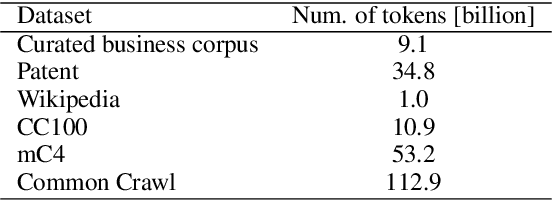Kosuke Arima
Pretraining and Updating Language- and Domain-specific Large Language Model: A Case Study in Japanese Business Domain
Apr 12, 2024



Abstract:Several previous studies have considered language- and domain-specific large language models (LLMs) as separate topics. This study explores the combination of a non-English language and a high-demand industry domain, focusing on a Japanese business-specific LLM. This type of a model requires expertise in the business domain, strong language skills, and regular updates of its knowledge. We trained a 13-billion-parameter LLM from scratch using a new dataset of business texts and patents, and continually pretrained it with the latest business documents. Further we propose a new benchmark for Japanese business domain question answering (QA) and evaluate our models on it. The results show that our pretrained model improves QA accuracy without losing general knowledge, and that continual pretraining enhances adaptation to new information. Our pretrained model and business domain benchmark are publicly available.
Training Generative Question-Answering on Synthetic Data Obtained from an Instruct-tuned Model
Oct 13, 2023



Abstract:This paper presents a simple and cost-effective method for synthesizing data to train question-answering systems. For training, fine-tuning GPT models is a common practice in resource-rich languages like English, however, it becomes challenging for non-English languages due to the scarcity of sufficient question-answer (QA) pairs. Existing approaches use question and answer generators trained on human-authored QA pairs, which involves substantial human expenses. In contrast, we use an instruct-tuned model to generate QA pairs in a zero-shot or few-shot manner. We conduct experiments to compare various strategies for obtaining QA pairs from the instruct-tuned model. The results demonstrate that a model trained on our proposed synthetic data achieves comparable performance to a model trained on manually curated datasets, without incurring human costs.
 Add to Chrome
Add to Chrome Add to Firefox
Add to Firefox Add to Edge
Add to Edge